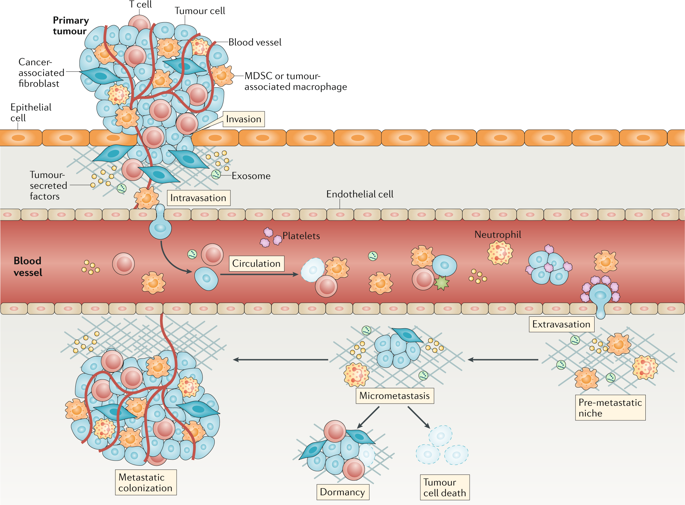Nature Reviews Clinical Oncology ( IF 81.1 ) Pub Date : 2018-12-04 , DOI: 10.1038/s41571-018-0134-8 Robin L Anderson 1, 2, 3 , Theo Balasas 4 , Juliana Callaghan 5 , R Charles Coombes 6 , Jeff Evans 7 , Jacqueline A Hall 8 , Sally Kinrade 3, 9 , David Jones 10 , Paul S Jones 11 , Rob Jones 7 , John F Marshall 12 , Maria Beatrice Panico 10 , Jacqui A Shaw 13 , Patricia S Steeg 14 , Mark Sullivan 3, 9 , Warwick Tong 3 , Andrew D Westwell 15 , James W A Ritchie 4, 11 ,

|
Most cancer-related deaths are a result of metastasis, and thus the importance of this process as a target of therapy cannot be understated. By asking ‘how can we effectively treat cancer?’, we do not capture the complexity of a disease encompassing >200 different cancer types — many consisting of multiple subtypes — with considerable intratumoural heterogeneity, which can result in variable responses to a specific therapy. Moreover, we have much less information on the pathophysiological characteristics of metastases than is available for the primary tumour. Most disseminated tumour cells that arrive in distant tissues, surrounded by unfamiliar cells and a foreign microenvironment, are likely to die; however, those that survive can generate metastatic tumours with a markedly different biology from that of the primary tumour. To treat metastasis effectively, we must inhibit fundamental metastatic processes and develop specific preclinical and clinical strategies that do not rely on primary tumour responses. To address this crucial issue, Cancer Research UK and Cancer Therapeutics CRC Australia formed a Metastasis Working Group with representatives from not-for-profit, academic, government, industry and regulatory bodies in order to develop recommendations on how to tackle the challenges associated with treating (micro)metastatic disease. Herein, we describe the challenges identified as well as the proposed approaches for discovering and developing anticancer agents designed specifically to prevent or delay the metastatic outgrowth of cancer.
中文翻译:

开发有效抗转移药物的框架
大多数癌症相关死亡是转移的结果,因此这一过程作为治疗目标的重要性不容低估。通过问“我们如何才能有效地治疗癌症?”,我们并没有捕捉到涵盖超过 200 种不同癌症类型(许多由多种亚型组成)的疾病的复杂性,并且具有相当大的肿瘤内异质性,这可能导致对特定治疗的不同反应。此外,我们关于转移瘤病理生理学特征的信息比原发肿瘤的信息要少得多。大多数到达远处组织的播散性肿瘤细胞,被陌生的细胞和外来微环境包围,很可能会死亡;然而,那些存活下来的肿瘤可能会产生与原发肿瘤具有明显不同生物学特性的转移性肿瘤。为了有效治疗转移,我们必须抑制基本的转移过程,并制定不依赖原发肿瘤反应的特定临床前和临床策略。为了解决这一关键问题,英国癌症研究中心和澳大利亚癌症治疗中心 CRC 成立了一个由来自非营利组织、学术界、政府、行业和监管机构的代表组成的转移工作组,以便就如何应对与治疗相关的挑战提出建议(微)转移性疾病。在此,我们描述了所发现的挑战以及发现和开发专门设计用于预防或延缓癌症转移生长的抗癌药物的建议方法。































 京公网安备 11010802027423号
京公网安备 11010802027423号